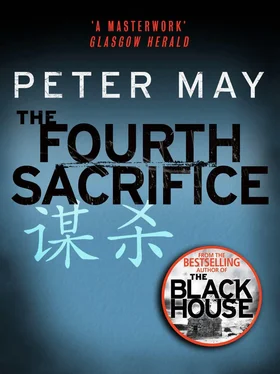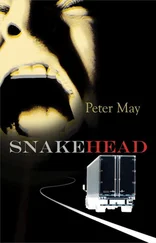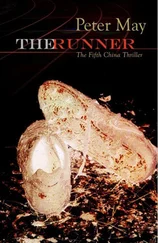Peter May - The Fourth Sacrifice
Здесь есть возможность читать онлайн «Peter May - The Fourth Sacrifice» весь текст электронной книги совершенно бесплатно (целиком полную версию без сокращений). В некоторых случаях можно слушать аудио, скачать через торрент в формате fb2 и присутствует краткое содержание. Год выпуска: 2012, Издательство: Quercus, Жанр: Триллер, на английском языке. Описание произведения, (предисловие) а так же отзывы посетителей доступны на портале библиотеки ЛибКат.
- Название:The Fourth Sacrifice
- Автор:
- Издательство:Quercus
- Жанр:
- Год:2012
- ISBN:нет данных
- Рейтинг книги:4 / 5. Голосов: 1
-
Избранное:Добавить в избранное
- Отзывы:
-
Ваша оценка:
- 80
- 1
- 2
- 3
- 4
- 5
The Fourth Sacrifice: краткое содержание, описание и аннотация
Предлагаем к чтению аннотацию, описание, краткое содержание или предисловие (зависит от того, что написал сам автор книги «The Fourth Sacrifice»). Если вы не нашли необходимую информацию о книге — напишите в комментариях, мы постараемся отыскать её.
The Fourth Sacrifice — читать онлайн бесплатно полную книгу (весь текст) целиком
Ниже представлен текст книги, разбитый по страницам. Система сохранения места последней прочитанной страницы, позволяет с удобством читать онлайн бесплатно книгу «The Fourth Sacrifice», без необходимости каждый раз заново искать на чём Вы остановились. Поставьте закладку, и сможете в любой момент перейти на страницу, на которой закончили чтение.
Интервал:
Закладка:
Of course, he realised, it might have been someone from the embassy. Their security officer, perhaps. Americans were fond of their aftershave. But it left Li feeling uneasy. If someone had searched the apartment in the diplomatic compound, had they found what they were looking for? He quickly gulped down the last of his beer and went in search of his shoes, buttoning his shirt and tucking it into his jeans as he went. He was damned if he was going to sit here feeling sorry for himself. If Yuan Tao had hidden something in the apartment he was renting illegally, he might also have hidden something in his embassy apartment. Something that may, or may not, still be there. But it was worth a look.
Li glanced at the time. It was a quarter to midnight. But it didn’t matter. There would be a guard on the gate of the compound all night.
II
Li wheeled his uncle’s bike through the gates of the diplomatic compound, and looked up at the windows. There were lights still on in quite a few of them — embassy staff and their families watching television or working late.
‘Where the hell do you think you’re going?’ The guard hurried out from behind the hut where he had been having a cigarette. He stamped it out under foot as he approached Li. It was not the same guard who had been on duty during his last visit.
Li played dumb. ‘What d’you mean?’
‘I mean, what makes you think you’ve got the fucking right to just waltz in there?’ The guard swaggered up to him. He was young and cocky, and a sneer curled his lip.
‘I’m going to visit a friend.’
‘No you’re not.’ The guard pushed his face close to Li’s. ‘Not unless I say you can.’
Li ignored the guard’s aggression and asked innocently, ‘Why not?’
The guard looked at him as if he had two heads. ‘Because this is a diplomatic compound, dickhead. And Chinese like you don’t get in unless I say so.’
Li drew out his Public Security ID wallet and thrust it in the guard’s face. ‘I don’t know if they taught you to read where you come from — dickhead .’ The guard’s startled face recoiled, almost as if from an electric shock. ‘But in case they didn’t, you’re talking to a senior ranking CID officer of the Beijing Municipal Police. And if I ever catch you talking to another Chinese like that again I’ll see to it that you spend the rest of your career on border patrol in Inner Mongolia.’ The guard blinked and gulped. His face had gone pasty pale. ‘Understand?’ The boy nodded. ‘Good,’ Li said. ‘And is that how you speak to foreigners?’
‘No, boss.’ The guard shook his head vigorously, completing his transformation from snarling hound to grovelling mongrel.
‘So if I was a yangguizi and I told you I was visiting a friend, what would you say?’
‘I’d check who it was you were going to see and then let you in.’
‘Wouldn’t they have to come down and get me?’
‘Only if you were a Chinese.’ He looked at the ground and wouldn’t meet Li’s eye. So it would be difficult, Li thought, for anyone who did not live in the apartment building to gain access to it, unless he was a foreigner.
‘Look at me, son,’ Li said, and the boy reluctantly raised his eyes. ‘That uniform doesn’t make you any better than anyone else. Treat people the way you would have them treat you.’ He tucked his ID into his back pocket and wheeled his bike on into the compound.
There was tape stuck across the door — black on yellow: ‘CRIME SCENE, DO NOT ENTER’. Li opened the door and ducked under the tape. He was struck immediately by the familiar smells of stale cooking and body odour. But there was no hint of the scent he had detected on his first visit. So it had been fresh. One of the Americans probably. The light in the entrance hall did not work, and he fumbled in the dark into the tiny living room and felt for the light switch. A fluorescent strip hanging from the ceiling flickered into life and washed the room in its cold, harsh light. It seemed very sad and empty. A lonely place where a single man spent long hours with only his books for company. What on earth had drawn him back to China? From a job of position and prestige at a top American university, to a lowly visa clerk in Beijing. What kind of life had he lived, processing paperwork at the Bruce Compound during the day, cooped up here alone at night with his books? And yet there had been another life. A secret life. Why had he needed another apartment? According to his neighbours he spent hardly any time there. It was not a meeting place. If he had received visitors his neighbours in the apartment building would have known. But someone had visited. Someone had entered late at night, unobserved. Someone had torn up the linoleum and found something hidden beneath the floorboards. Someone had murdered Yuan Tao there and left unseen.
Li examined the linoleum in the living room. Bookcases stood along one edge of it, piles of books and magazines along the other. One could not have lifted it without moving almost everything in the room. There were no creases or tears obvious to the naked eye. He felt a tiny stab of disappointment.
He turned his attentions then to the bedroom, stripping the bed and checking the mattress and the base. There was nothing. He moved the wardrobe and tapped it front and back for hidden panels. But it was a utilitarian piece of furniture. What you saw was what you got. The linoleum in here had been tacked to the floor.
He went through to the toilet. But it was too small to hide anything. Plaster walls, concrete floor, one tiny cabinet on the wall. Li unscrewed the top of the cistern and looked inside. A cheap plastic mechanism winked up at him from the clear cold water that filled it. He stooped to remove the hair that had gathered in the drainer in the floor beneath the shower head and tried to prise it loose. But it was stuck fast. He washed his hands and went back through to the living room. He checked the armchair, pulling all its cushions away, then tipping it on to its side and tearing the hessian base to reveal the springs within its frame. Nothing.
He looked around, disappointed. Frustrated. All that remained were the books. He squatted down and began lifting them out in batches of six or eight, piling them on the floor at his feet. There were dozens of political volumes. Books on the history and development of the Communist Party in China, a Chinese translation of the works of Karl Marx, a series on the development of democracy in Taiwan, a fat volume on political changes in Hong Kong since the handover. There was a history of the Kuomintang and the legacy of Chiang Kai-Shek, another on the Chinese Secret Service written by two French journalists. Almost an entire shelf was devoted to the bloody events that had occurred in Tiananmen Square in ’89: The Long March to the Fourth of June; Cries for Democracy; Voices from Tiananmen Square; Death in Beijing . Yet another shelf seemed devoted to books on the Cultural Revolution. Li picked one out. Like most of the others it was in English. A Memoir of the Chinese Cultural Revolution . He opened it and saw that it had been first published in China in the late 1980s by the Workers’ Publishing House, before an American company had published this translation in the mid-nineties. There was a bookmark near the back of the book, and Li wondered if Yuan had been reading it in the days before he died. He flicked through to the marked page and the bookmark fell to the floor. He scanned the pages, but there was nothing of significance in them, and he lifted the bookmark to put it back and realised that it was in fact a sheet of paper twice folded. He put the book down and unfolded it. It had yellowed slightly and was a little brittle. There were handwritten Chinese characters scrawled across it, and Li realised that it was a letter. It was addressed to Yuan Tao c/o the University of California, Berkeley. The sender lived at an address at Guang’anmen in south-west Beijing. Li glanced to the foot of the page and saw that it was signed by Yuan’s cousin, Yang Shouqian.
Читать дальшеИнтервал:
Закладка:
Похожие книги на «The Fourth Sacrifice»
Представляем Вашему вниманию похожие книги на «The Fourth Sacrifice» списком для выбора. Мы отобрали схожую по названию и смыслу литературу в надежде предоставить читателям больше вариантов отыскать новые, интересные, ещё непрочитанные произведения.
Обсуждение, отзывы о книге «The Fourth Sacrifice» и просто собственные мнения читателей. Оставьте ваши комментарии, напишите, что Вы думаете о произведении, его смысле или главных героях. Укажите что конкретно понравилось, а что нет, и почему Вы так считаете.












